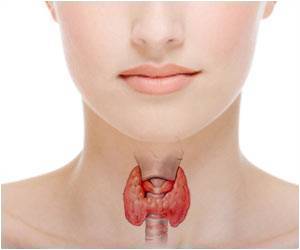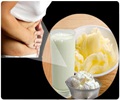Highlights
- Milk-alternative drinks like soy and almond milk may cause iodine deficiency, according to research from the University of Surrey
- The iodine concentration of all the unfortified milk-alternative drinks was less than 2% of cow’s milk
- Iodine is a micronutrient which is important for thyroid function and fetal brain development
Link Between Milk-Alternative Drinks and Iodine Deficiency
A research team from the University of Surrey examined the iodine content of 47 milk-alternative drinks such as soy, almond, coconut, oats, rice, hemp and hazelnut. The iodine content of milk-alternatives was compared with that of cow’s milk. However, milk-alternatives available in the market specifically for infants and children were not included in the study. The findings showed that a majority of milk-alternative drinks did not have adequate amounts of iodine. The iodine concentration levels of milk-alternative drinks were around 2% of that found in cow’s milk.A glass of milk-alternative drink contains 2mcg of iodine which is a very small proportion of the adult recommended iodine intake of 150mcg/day. Although most of the milk-alternative drinks are fortified with calcium, only three of the 47 drinks were fortified with iodine.
Cow’s milk and dairy products are the main sources of iodine. The findings of the study show that most of the milk-alternative drinks may not be a substitute for cow’s milk.
Margaret Rayman, Professor of Nutritional Medicine at the University of Surrey, said, "Many people are unaware of the need for this vital dietary mineral and it is important that people who consume milk-alternative drinks realize that they will not be replacing the iodine from cows' milk which is the main UK source of iodine. This is particularly important for pregnant women and those planning a pregnancy.”
Milk-alternative drinks are being used as a substitute due to allergy or intolerance to cow’s milk. Most of the milk-alternative drinks are not fortified with iodine. People who avoid milk and dairy products need to ensure that they have iodine from other dietary sources like white fish. People who consider taking iodine supplement should avoid kelp, which can provide excessive amounts of iodine, said, Dr Sarah Bath, Lecturer in Public Health Nutrition at the University of Surrey and registered dietitian.
The findings of the study are published in the British Journal of Nutrition.
Iodine Deficiency
Iodine is a micronutrient which is required for thyroid function. Iodine is an essential nutrient during pregnancy as it supports normal fetal brain development. Daily recommended intake of iodine during pregnancy is 200 mcg/day, but, milk-alternative drinks provide less than 2% of the recommended levels. Previous research conducted by the University of Surrey found that iodine deficiency during pregnancy was linked to lower IQ and reading scores in children for up to 9 years of age.Dietary Sources of Iodine
Some of the dietary sources of iodine are seaweed such as kelp, nori, kombu, and wakame. Other sources include seafood (cod, sea bass, haddock, and perch), dairy products, eggs and whole grains.Recommended Dietary Allowances for Iodine
| Age | Male | Female | Pregnancy | Lactation |
| Birth to 6 months | 110 mcg | 110 mcg | ||
| 7–12 months | 130 mcg | 130 mcg | ||
| 1–8 years | 90 mcg | 90 mcg | ||
| 9–13 years | 120 mcg | 120 mcg | ||
| 14–18 years | 150 mcg | 150 mcg | 220 mcg | 290 mcg |
| 19+ years | 150 mcg | 150 mcg | 220 mcg | 290 mcg |
References
- Sarah C. Bath, Sarah Hill, Heidi Goenaga Infante, Sarah Elghul, Carolina J. Nezianya, Margaret P. Rayman. Iodine concentration of milk-alternative drinks available in the UK in comparison with cows’ milk. British Journal of Nutrition, 2017; 1 DOI: 10.1017/S0007114517002136
- Introduction to Iodine - (https://ods.od.nih.gov/factsheets/Iodine-HealthProfessional/)
Source-Medindia















